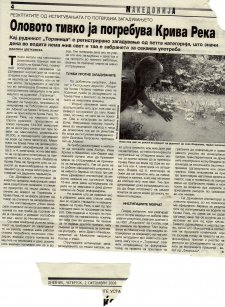By David Heller (Posted: January 15, 2009)
A trademark of the French legal system is being challenged by President Nicolas Sarkozy, angering critics who fear that his proposed changes will upset and weaken the nation’s rule of law.
The centerpiece of Sarkozy’s plan calls for the abolishment of investigating magistrates (“Juges d’Instruction,” in French), an institutional relic of the Napoleonic era that has generated considerable opposition in recent years.
Unlike the American or British accusatorial legal systems, in which prosecution and defense teams assemble evidence and argue their relative cases in front of a judge, French juges d’instruction operate within an inquisitorial system. This empowers them to independently work with police to acquire evidence and convey their findings of guilt or innocence to a judge, who then decides the fate of a case.
This concentration of power has facilitated a series of notable abuses and botched cases. For instance, in 2000, 13 citizens were wrongly imprisoned for years because of the flawed investigation of an eager but inexperienced magistrate who ignored exonerating evidence.
To minimize the repetition of similar breaches of justice, Sarkozy proposed replacing magistrates with state prosecutors, effectively turning them into subordinate government employees held accountable by the justice ministry.
But this change will ostensibly eliminate their independence, one of the great strengths of the inquisitorial system. At times, the concentrated power of magistrates enabled them to resist pressure during sensitive investigations of powerful political and corporate players. Most famously, they uncovered the 1990s Elf corruption scandal, in which French oil tycoons were jailed for illegally taking millions of dollars from state-owned company funds.
Apologists of investigating magistrates argue that state employed prosecutors will lack the gumption to bring similar powerful forces to justice. In their opinion, the new system would subject prosecutors to pernicious and manipulative political influence, which will extend beyond cases of financial fraud and taint the overall provision of justice in the country.
As the Belfast Telegraph reports,
One of France’s best-known investigating magistrates, Gilbert Thiel, the head of the judicial anti-terrorist unit, broke the customary silence of juges d’instruction yesterday to reject the proposals as anti-democratic. “This reform will mean that all sensitive cases, not just political investigations, but also large fraud and public health cases, will be subject to political interference,” he said.
The desirability of Sarkozy’s plan hinges on how it will affect France’s rule of law. On the one hand, a just society requires that the rights of citizens under investigation – especially their right to be presumed innocent until proven guilty – be protected at all costs. Guilt can only be determined once all of the evidence pertaining to a case is weighed by a judge. But by granting magistrates the power to dictate what evidence is presented in trial, the French system has injected an element of subjectivity into its legal system that calls into question whether a person has been given a fair trial.
On the other hand, a society must be ruled by laws that are objectively and independently enforced, so that political or economic considerations do not affect what laws are enforced when, and what penalties are levied for their violation. But by eliminating the magisterial institution’s independence and placing prosecutions within the state’s purview, Sarkozy’s plan might deter the prosecution of important government or business officials with political connections.
As one anonymous magistrate exclaimed,
“We’d be returning to the 1970s and 1980s, when we still hadn’t gained freedom from politicians and were constantly seeing cases taken out of our hands and quashed for purely political reasons. Even today, who besides an independent magistrate will dare order a minister’s house searched, or an important politician or businessperson questioned in a legitimate criminal case? Certainly not a prosecutor!”
Is it possible for France – or any country – to satisfy all of the aforementioned requirements in its legal system, or are they mutually exclusive? Ultimately, to protect their rule of law, French reformers must be guided by a mandate to strive for these ideals and create a system ruled by laws, and not men.




